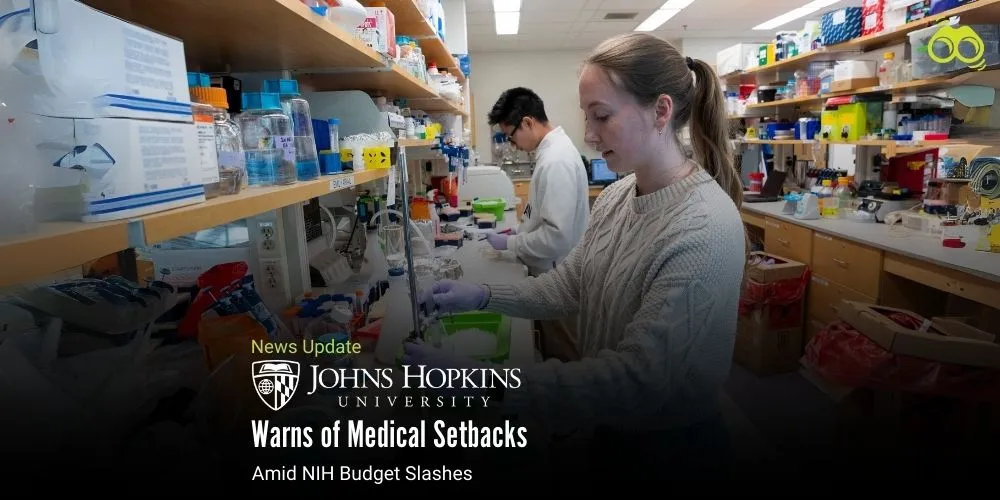Academic Independence Under Strain as Research Funding Becomes Political
Federal Cuts Threaten Medical Research: Johns Hopkins Leads Advocacy Push
Johns Hopkins University has notably recalibrated its approach to federal engagement, responding to mounting political pressure with a blend of assertive and nuanced strategies. This year’s Hopkins on the Hill event marked a departure from its traditional science fair format, evolving into a targeted advocacy platform aimed at demonstrating the tangible public benefits of federally funded research. Held in a congressional cafeteria, the event featured researchers such as Brittany Jenkins-Lord, whose work focuses on reducing breast cancer mortality among Black women, underscoring the university’s commitment to impactful, inclusive science.
In addition to public outreach, Johns Hopkins has adopted more direct measures, including filing lawsuits and engaging GOP-aligned lobbyists. Simultaneously, it has launched a softer communications campaign, utilising social media, press releases, and a dedicated website to spotlight medical advancements made possible through federal support. This dual strategy reflects an effort to maintain institutional credibility while avoiding overt confrontation with the Trump administration.
However, the effectiveness of such subtle messaging remains uncertain. While Johns Hopkins seeks to emphasise its societal contributions, other institutions have chosen divergent paths. Harvard has mounted a strong resistance, whereas Columbia appears to favour negotiation. Communications expert Danny Franklin has cautioned that understated advocacy may no longer suffice, urging universities to articulate their value more explicitly and transcend political divisions.
Dr Bobby Mukkamala, president of the American Medical Association and a brain cancer survivor, reinforced the urgency of public engagement. He cited his reliance on medication developed at Duke University with federal funding, questioning whether the broader public truly grasps the stakes involved. His remarks echo widespread concern among academic leaders regarding the precarious state of research funding. Historically, universities have championed biomedical research support, yet the current political climate has intensified the challenge. A report by the Association of American Medical Colleges revealed that the National Institutes of Health (NIH) has slashed $3.8 billion in grants nationwide, affecting major beneficiaries such as Johns Hopkins. Heather Pierce of the Association noted that while advocacy has always been essential, today’s environment demands a more vigorous defence of research funding.
The Trump administration’s targeting of research related to diversity, equity, inclusion, and vaccines has drawn sharp criticism, including from Health Secretary Robert Kennedy. Funding reductions have extended beyond the NIH to agencies such as the National Science Foundation and the Departments of Energy and Defence. A particularly severe setback occurred with the closure of the U.S. Agency for International Development, resulting in a loss of $800 million and 2,000 global jobs for Johns Hopkins. Despite a brief public reaction, Danny Franklin observed that attention quickly shifted amid the rapid pace of political developments. University leaders have voiced grave concerns about the long-term consequences of these funding cuts, warning that they could erode scientific talent and stall critical medical progress. They fear that dismantling research infrastructure today may render future recovery efforts exceedingly difficult.
Editor’s Note:
The growing tension between American universities and the federal government has reached a turning point, especially when it comes to research and innovation. Johns Hopkins University’s experience shows how institutions are now having to both defend their work and rethink how they communicate its importance. At a time when research is being questioned or politicised, it’s more important than ever to remember how much federally funded science contributes to public health, fairness, and progress. With major funding cuts and political debates putting research at risk, the future of medical advances and scientific growth is uncertain. University leaders and researchers are speaking out, but lasting change will only happen if both the public and policymakers truly understand what’s at stake. Losing this support now could slow down cures, stall discoveries, and weaken the next generation of scientists.
Skoobuzz asserts that in this critical moment, open dialogue, strong public support, and a firm commitment to science-driven research are essential to protect the future of innovation and human well-being.














0 Comments (Please Login To Continue)